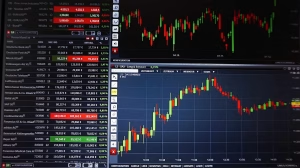In the rapidly evolving world of digital currencies, two names have gained significant attention in recent years: Bitcoin and Trump Coin. While both are decentralized, digital, and traded online, they have distinct differences in their underlying technologies, use cases, and market performances. In this article, we will delve into the details of Bitcoin vs Trump Coin, providing an in-depth comparison of these two digital currencies.
Bitcoin: The Pioneer of Digital Currencies
Launched in 2009 by an individual or group of individuals using the pseudonym Satoshi Nakamoto, Bitcoin is the first decentralized, peer-to-peer digital currency. Its decentralized nature means that there is no central authority controlling the supply of Bitcoins, unlike traditional fiat currencies. Bitcoin’s underlying technology is based on a blockchain, a public ledger that records all transactions, ensuring a secure, transparent, and tamper-proof environment.
With a market capitalization of over $1 trillion, Bitcoin is the largest digital currency by market value. Its price volatility has led to significant price swings, attracting a wide range of investors, from institutional investors to individual traders. Bitcoin’s use cases are diverse, including e-commerce transactions, remittances, and investment. Its value is not tied to any government or institution, making it an attractive alternative investment option.
Trump Coin: The Personal Currency
In 2019, Donald Trump Jr., son of the 45th President of the United States, launched Trump Coin, a digital currency that aims to promote the Trump family brand. The coin is based on the Ethereum blockchain and is usable for transactions on the platform. Trump Coin is not designed to be a traditional digital currency but rather a collectible, digital token that serves as a marketing tool for the Trump brand.
Trump Coin’s market capitalization is significantly lower than Bitcoin’s, with a current value of around $1 million. Its use cases are limited, and its value is largely dependent on the Trump family’s reputation and brand recognition. As a result, Trump Coin is not a widely accepted mode of payment and is primarily used for speculative trading.
Key Differences and Similarities
The key differences between Bitcoin and Trump Coin are:
- Purpose: Bitcoin is designed as a decentralized digital currency for transactions and investment, while Trump Coin is a collectible token for marketing and branding.
- Market capitalization: Bitcoin’s market capitalization is significantly higher than Trump Coin’s.
- Use cases: Bitcoin has a wide range of use cases, including e-commerce transactions, remittances, and investment, while Trump Coin’s use cases are limited to the Trump brand.
- Underlying technology: Bitcoin is based on its own blockchain, while Trump Coin is based on the Ethereum blockchain.
However, both Bitcoin and Trump Coin share some similarities:
- Decentralized: Both are decentralized, meaning that there is no central authority controlling their supply.
- Digital: Both are digital currencies, existing solely in the digital world.
- Traded online: Both can be traded online, with Bitcoin available on various cryptocurrency exchanges.
Conclusion
In conclusion, Bitcoin and Trump Coin are two distinct digital currencies with different purposes, underlying technologies, and market performances. While Bitcoin is a widely accepted digital currency with a wide range of use cases, Trump Coin is a collectible token with limited use cases. For investors and traders looking to diversify their digital currency portfolios, Bitcoin remains a more attractive option due to its significant market capitalization and widespread adoption. However, Trump Coin may appeal to those looking to invest in a unique, brand-specific digital currency.
As the digital currency market continues to evolve, it is essential to stay informed about the latest developments and trends in this rapidly changing landscape. By understanding the differences and similarities between Bitcoin and Trump Coin, investors and traders can make more informed decisions about their digital currency investments.








